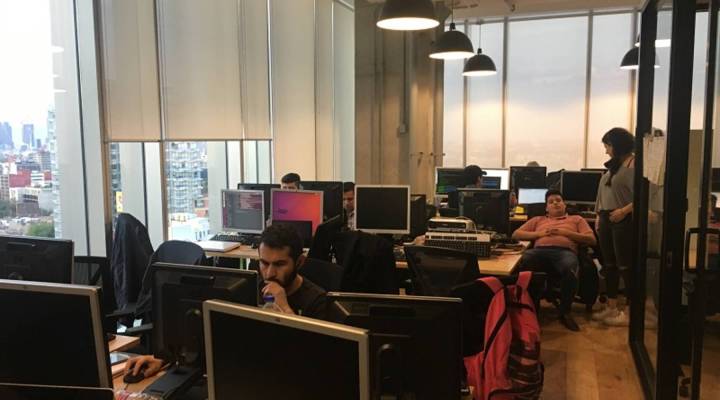
Some immigrants returning to Mexico find new opportunities
Some immigrants returning to Mexico find new opportunities

About a year ago, Eddie Barrañón arrived in Mexico City. It was a place he hadn’t seen in half a lifetime and where the only relative he had was his estranged father.
Barrañón, a 27-year-old with the muscular build of a former high school wrestler, had been living in the U.S. illegally since his parents took him to Illinois when he was 14. He had returned voluntarily to Mexico after he “got into some trouble,” he said. Like many young immigrant returnees in Mexico City, Barrañón initially found work at a call center making less than $2 an hour.
Then one day last fall, someone suggested to Barrañón that he apply to a coding school that was geared toward young returning immigrants. It would pay him a stipend to go to class. Barrañón thought it was too good to be true.
“Not a scam, but I thought it was, like, a fake,” Barrañón said. “Like, it wasn’t going to be true. There was something iffy about it.”

Eddie Barrañón, a 27-year-old who grew up just outside Chicago, is one of about two dozen students in a coding class for young immigrants returning to Mexico.
Many young unauthorized immigrants who were taken to the U.S. as children are considering their options as the Deferred Action for Childhood Arrivals program is set to expire in early March. A few have returned to Mexico, looking for opportunities they didn’t have in the U.S.
About two dozen young returnees, including Barrañón, are enrolled in a software engineering boot camp that was started by two Mexico City entrepreneurs last year. The course, called Hola </code>, was designed after Hack Reactor, a popular coding school in San Francisco.
The students in Mexico City grew up in states across the U.S., from Oregon to Illinois and North Carolina to Florida. Had they stayed in the United States, they would be among the group referred to as “Dreamers,” who were brought to the U.S. as children without proper documents.
The course is funded by a Mexican foundation and a local angel investor. Students receive a monthly stipend — the equivalent of about $270 — and agree to pay their tuition of about $6,000 only if they gain employment as software engineers after graduating, said Marcela Torres, one of the founders.
“We were given this gift from the United States,” Torres said. “I know it’s horrible to say it that way, because I know they miss it, and they call it home. But if Mexico really took the opportunity and used their potential, it could be endless.”
For young immigrants who grew up in the U.S., the transition to Mexico is often marred with the challenges of being far from relatives and from familiar surroundings, said Eduardo García, a Mexico City businessman who spoke to the students recently.
García arrived in Mexico City in 2008, after the third time he was deported. When people get to Mexico, many just want to go back, he said. Garcia initially got a job as a cook, similar to what he had done in Atlanta. He now owns Maximo Bistrot and two other trendy restaurants in Mexico City, employing about 100 people.
“The first few months that I was here, I was really depressed,” García said. “You don’t see Mexico on the rise, a Mexico that needs people like them, a Mexico that needs bilingual people, a Mexico that needs engineers.”
Matin Tamizi, an entrepreneur based in San Francisco, started and sold a financial services company in Silicon Valley called Balanced and is now looking to do the same in Mexico. He’s looking to hire engineering and marketing professionals who grew up and went to university in Mexico, but also people who are bilingual and have had first-hand experience with Mexican and American work environments, he said. He is considering hiring from the Dreamer coding school.
“They essentially become the bridge between the way that we do business as an American company to our target customers, which is in the Mexican market,” Tamizi said.
This is a welcome prospect for Barrañón. He initially wanted to return to Illinois to be with his wife and two children, who are all U.S. citizens, but now he has a different message when he calls his wife.
“I’m like: ‘Hey, I really don’t want to go back. We can live a life here. We can do a lot of stuff,’” he said. “I have a lot of plans.”
Barrañón eventually wants to start his own business. Mexico is a land of opportunity, he said. It just takes time to see it.
There’s a lot happening in the world. Through it all, Marketplace is here for you.
You rely on Marketplace to break down the world’s events and tell you how it affects you in a fact-based, approachable way. We rely on your financial support to keep making that possible.
Your donation today powers the independent journalism that you rely on. For just $5/month, you can help sustain Marketplace so we can keep reporting on the things that matter to you.












